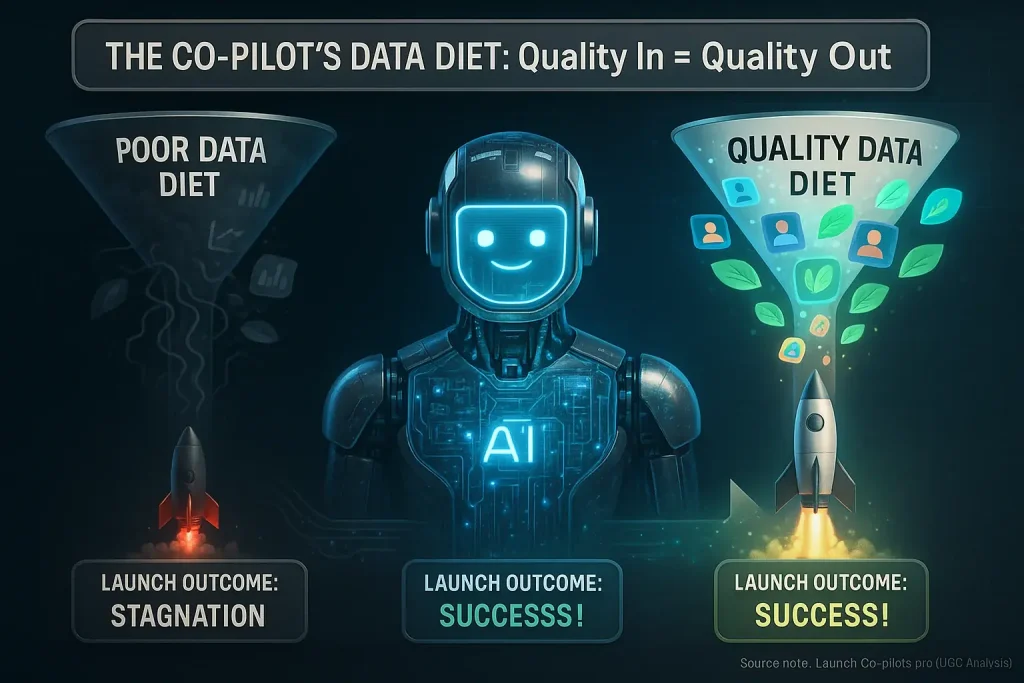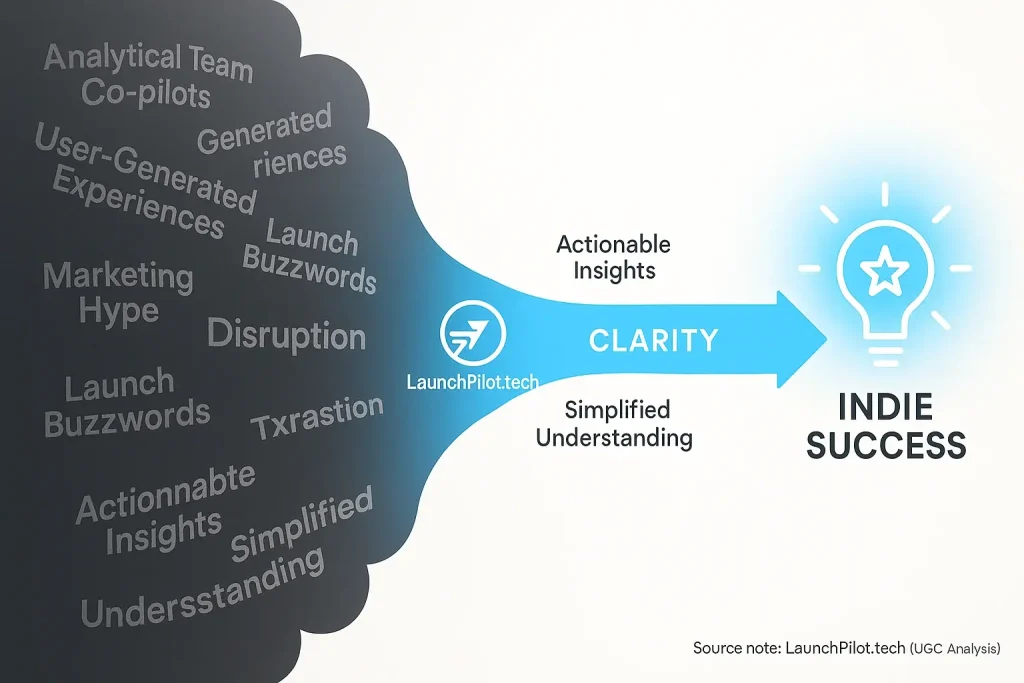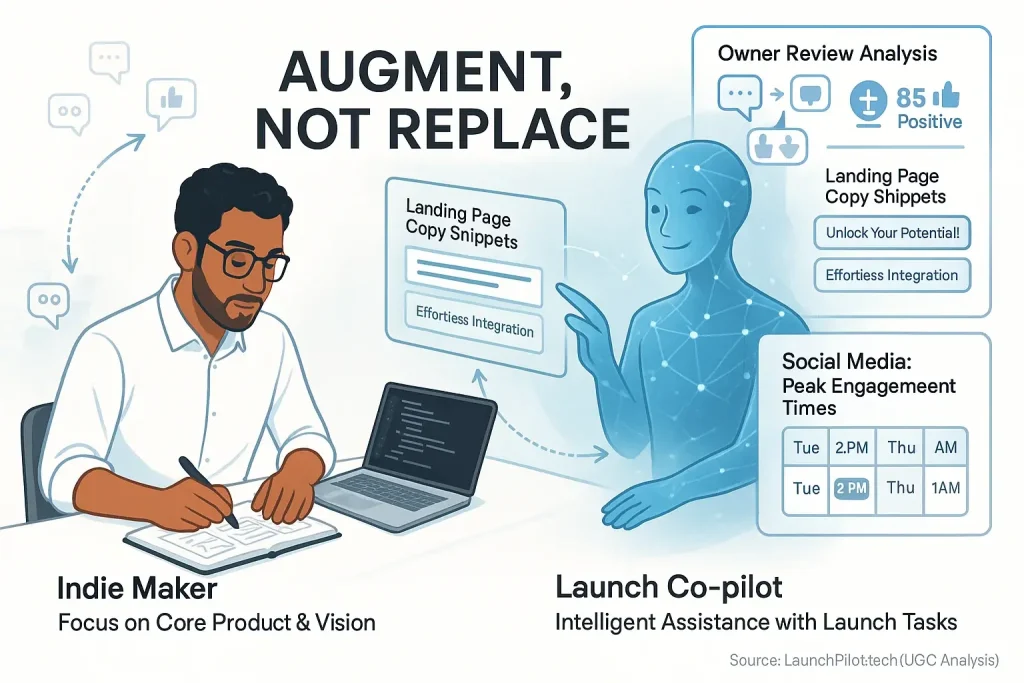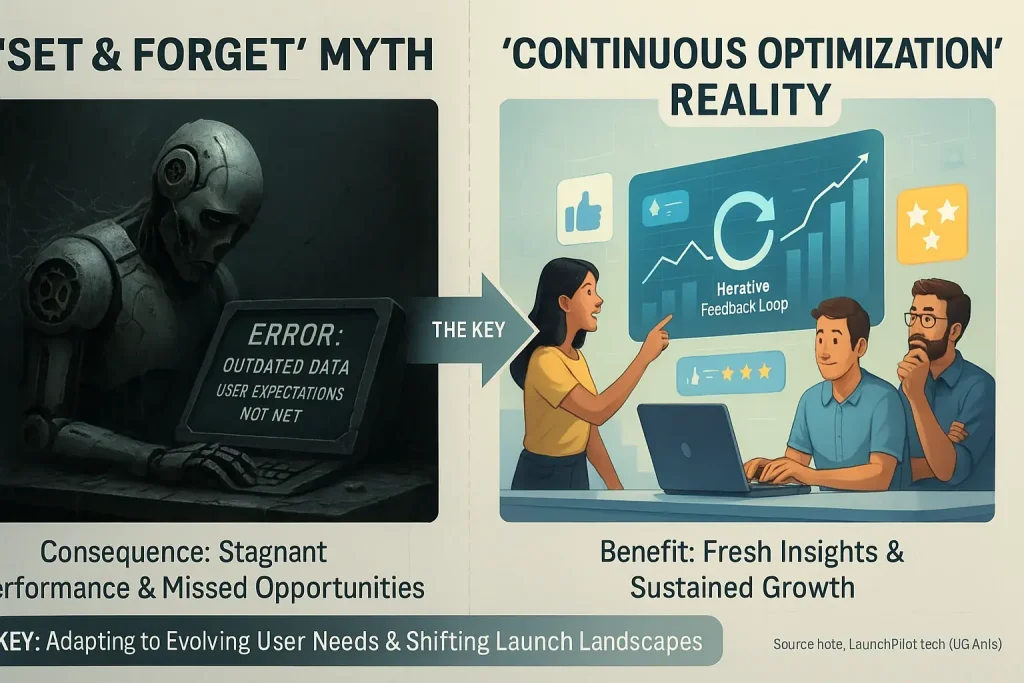Beyond the Hype: Why Your AI Co-pilot Selection Needs a Smarter Checklist
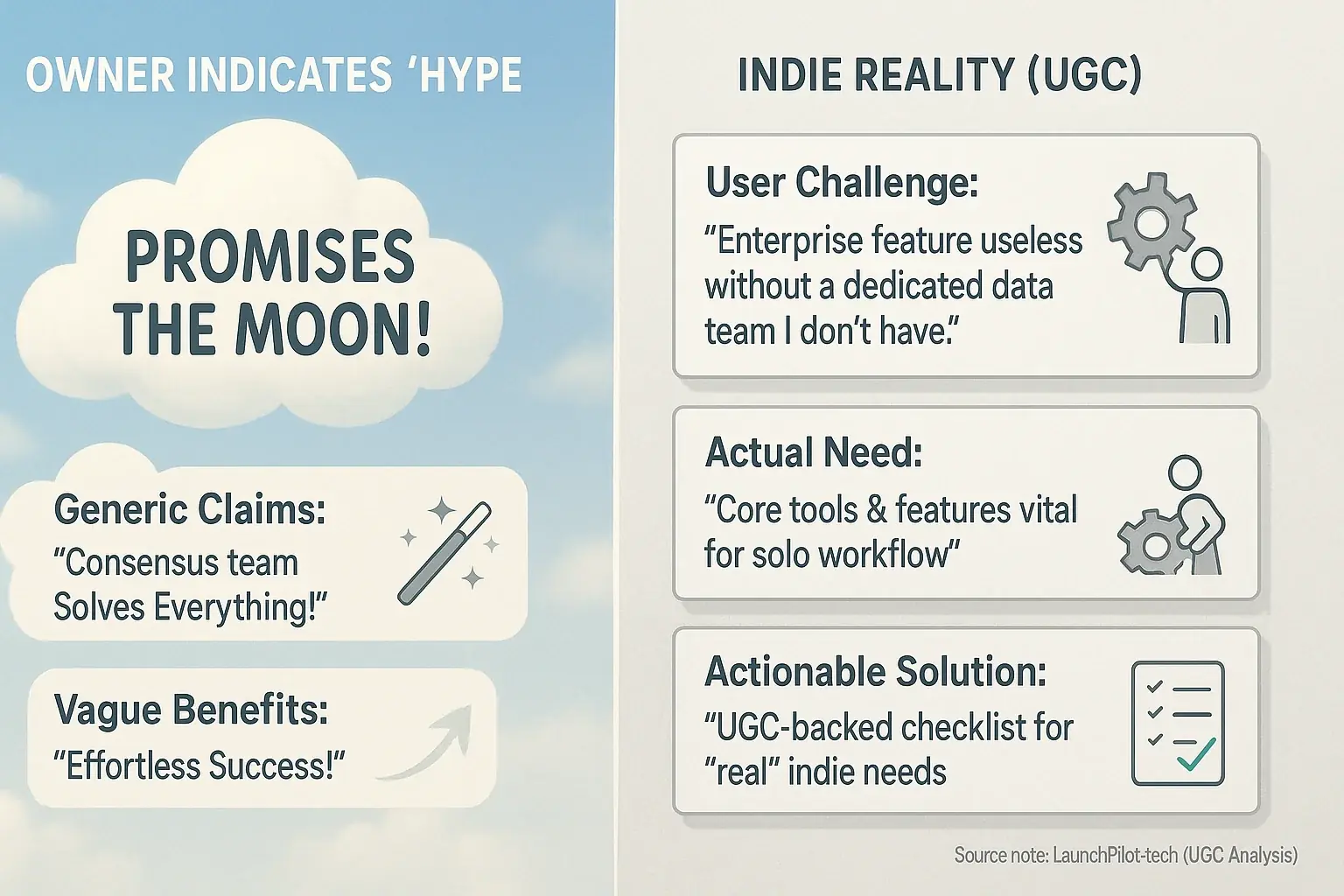
Feeling overwhelmed by 'our feedback co-pilots' everywhere? You are not alone. Every tool promises the moon. How do you cut through that noise? Generic reviews often fail solo founders. They miss what truly matters for your indie project.
Indie maker needs differ fundamentally from enterprise needs. This is an unspoken truth. Our analysis of indie maker discussions reveals a key pattern. Critical features for solopreneurs often get overlooked by standard review sites. Imagine adapting an enterprise-focused our feedback co-pilot for weeks. Then you realize its 'killer feature' is useless. You lack the dedicated data science team. That is a common story emerging from user-generated content.
Our ultimate indie maker checklist helps here. We distilled collective wisdom. This wisdom came from countless user experiences. It also came from forum rants and success stories. The checklist gives you criteria that actually matter. These criteria guide your our feedback co-pilot selection effectively.
Your Interactive AI Co-pilot Evaluation Checklist: Weigh What Really Matters
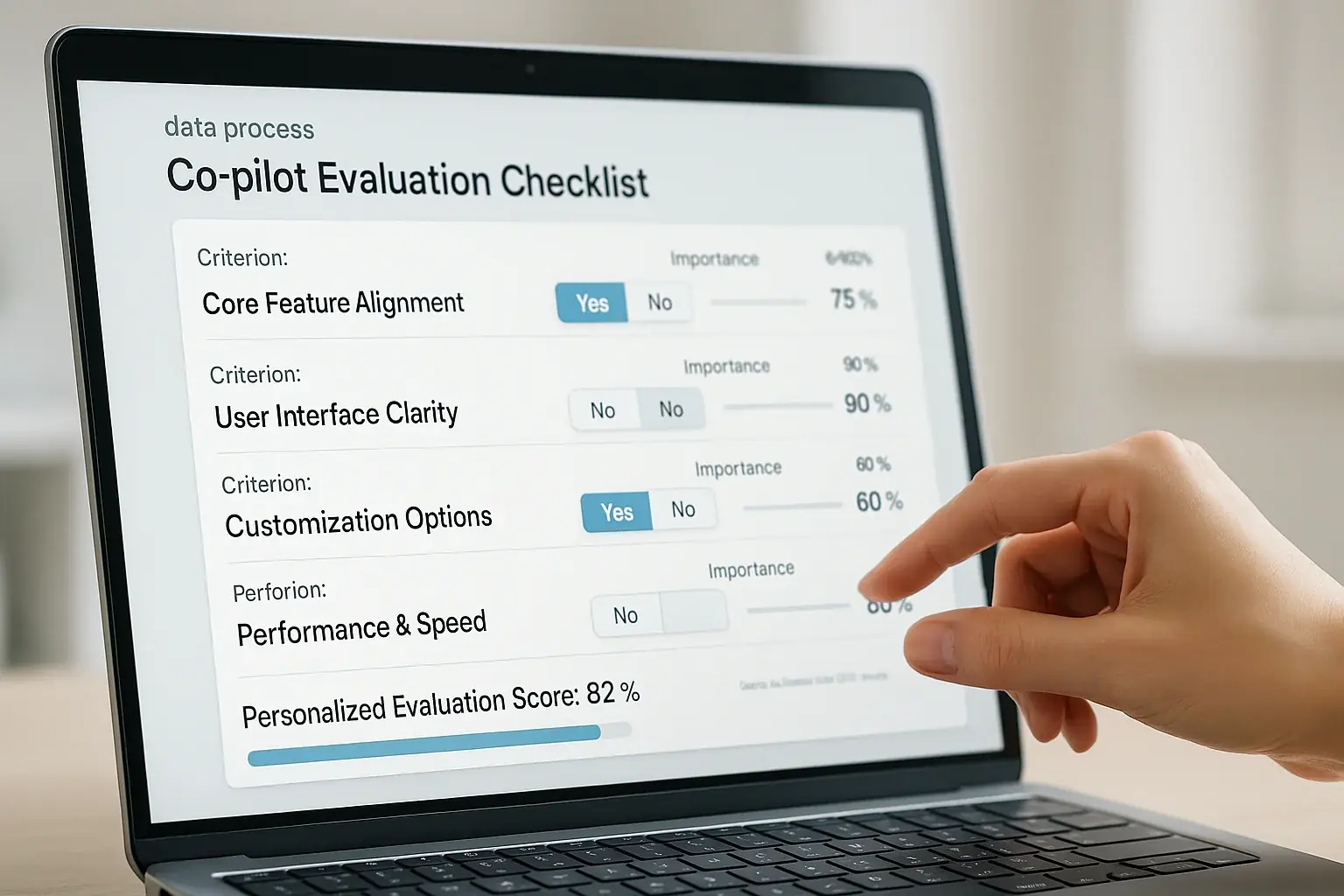
Rate Potential AI Co-pilots Against Your Indie Needs
Ready to put your potential consensus analysis co-pilot to the test? Use the interactive checklist above. It helps you score tools. You score against criteria that truly impact your indie launch. These criteria? They are distilled from what real indie makers find crucial. Simply select 'Yes' or 'No' for each point. Or, adjust the sliders. This action reflects your unique priorities. The tool personalizes your entire evaluation process.
Your results will highlight key areas. A tool excels or falls short right there. This gives you a clear, data-driven snapshot. Informed decisions follow. Remember, no tool is perfect. The right one aligns with your specific needs and acknowledged pain points. This truth emerges consistently from indie maker experiences. Use this insight to ask sharper questions. You can compare options more effectively during trials. Revisit this tool. Your needs often evolve; this resource adapts.
Indie-Friendliness: Beyond the Price Tag (UX, Support & The 'Solo Maker' Test)
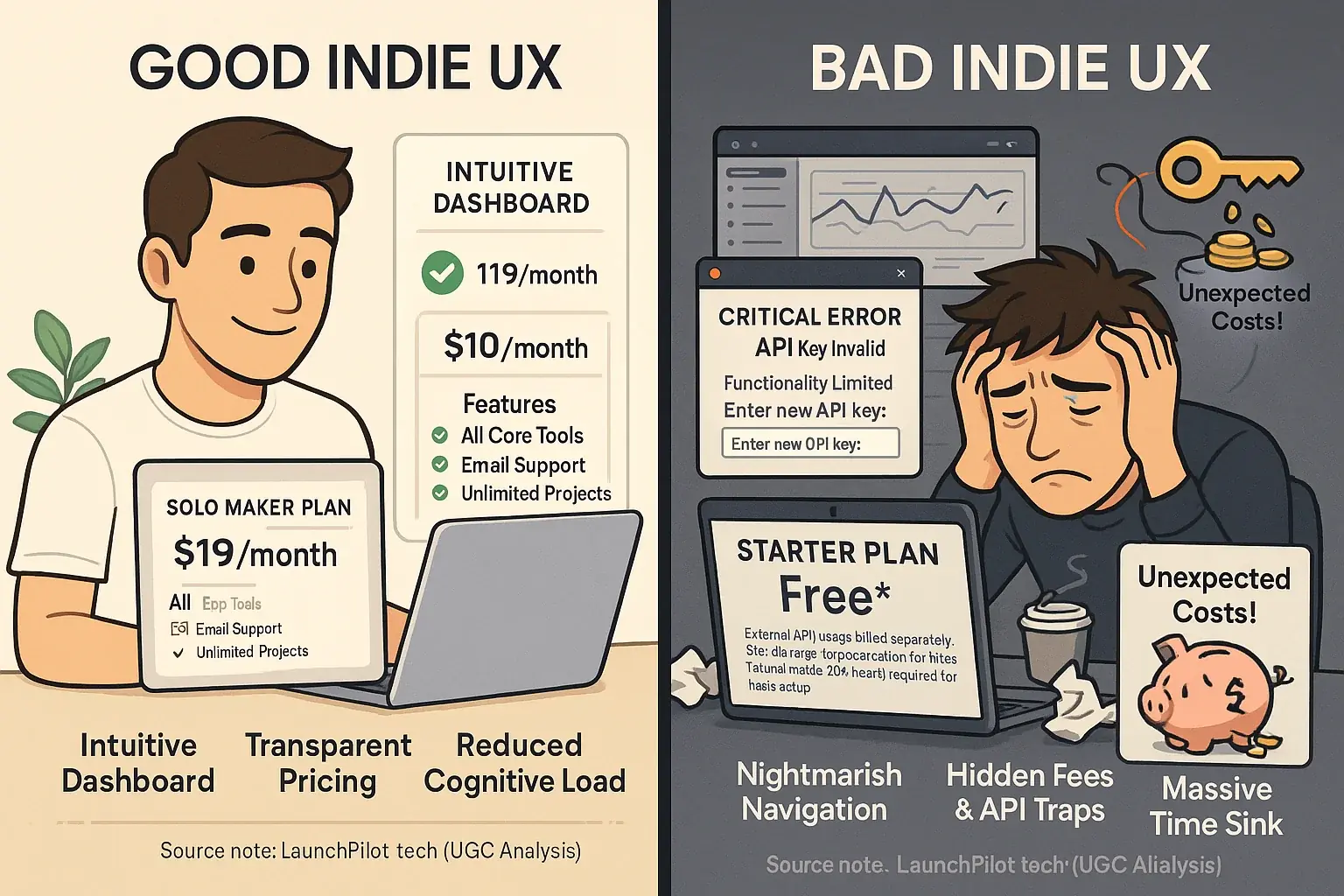
Many platforms boast 'indie-friendly' labels. But what does that really mean for you? It’s far beyond just a cheap price tag. For solo makers, 'friendly' translates to intuitive user experiences. These systems don't demand a data science degree. They don't need a dedicated support specialist. True indie-friendliness, our analysis of user feedback shows, actively reduces your cognitive load. It slashes daily friction. This saves invaluable time.
Let's uncover some unspoken truths from community discussions. Indie makers consistently report frustration with overly complex tools. Stunning dashboards sometimes conceal nightmarish navigation. Users say some platforms feel like they require an onboarding specialist. Then there are the 'free' tools. These often demand external API keys for core functions, as many indie developers discover. Suddenly, 'free' incurs unexpected usage costs. One developer shared their story. A tool’s 'intuitive setup' actually meant ten-plus hours watching tutorials. Just to connect their email. That is a massive hidden cost. It's time no solo founder possesses.
What about support? For a team of one, this is critical. Getting stuck means your entire launch can grind to a halt. Responsive, human-centric support becomes an absolute lifeline. This applies even to entry-level plans. Community-reported experiences frequently highlight immense frustration. 'Enterprise-only' support channels are a major pain point. Automated chatbots that offer zero real solutions also draw heavy criticism. An indie-friendly co-pilot must truly support the solo journey.
Core Automation Relevance: Does It Actually Automate Your Biggest Launch Headaches?
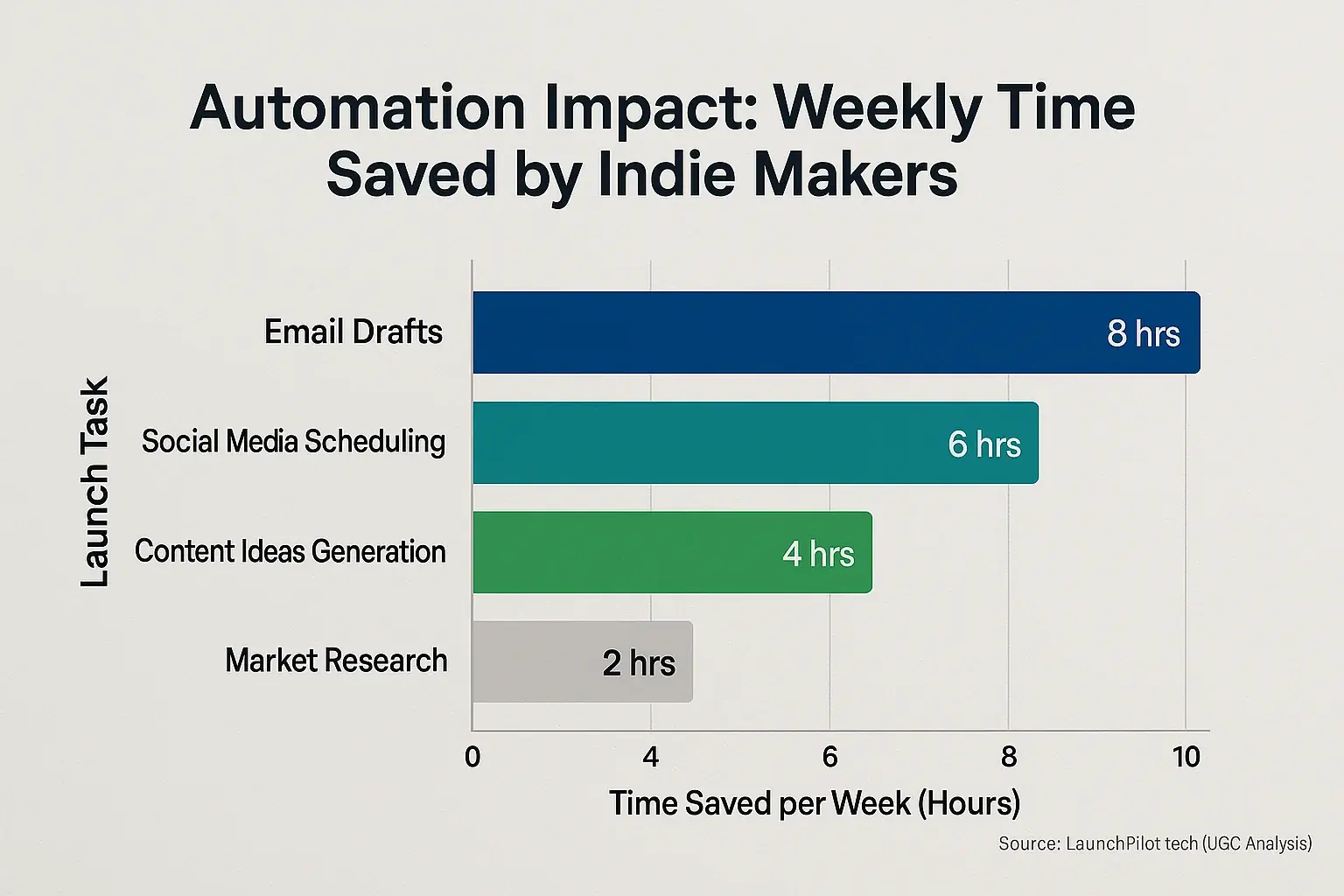
Automation promises much. The dream for indie makers is simple: slash grunt work. Free up your time. For you, 'automation' must tackle your biggest launch headaches. Does it manage endless email sequences? Or does it simplify social media scheduling that devours your day? These are the real tests.
Our deep dive into user-generated content reveals a clear pattern. The most valued launch co-pilots avoid feature bloat. Instead, they reliably automate critical tasks. These tasks consume a huge slice of an indie maker's launch time. Think drafting initial launch emails. Or scheduling consistent social media updates. Even generating foundational content ideas counts. One maker shared how a co-pilot cut their email drafting from a full day to mere hours. This allowed crucial focus on product polish. That is genuine impact.
Now, for a hard truth many indie creators discover. Beware 'automation' needing constant manual fixes. Or endless, frustrating tweaks. You might spend more time correcting a co-pilot's output than creating from scratch. That is not true automation. Community forums echo this pain. Users report tools promising effortless support. These tools then deliver complex setups. Or they demand perfect input data. Such demands often increase workload for resource-strapped makers.
So, before you commit to a launch co-pilot, ask a tough question. Does this platform genuinely lift a significant, painful task from your shoulders? Or does it introduce another layer of complexity? The answer defines its true worth to your indie launch. Quality of automation trumps sheer feature quantity. Every time.
Strategic Guidance Quality: Is AI's 'Advice' Gold, or Just Generic Noise?
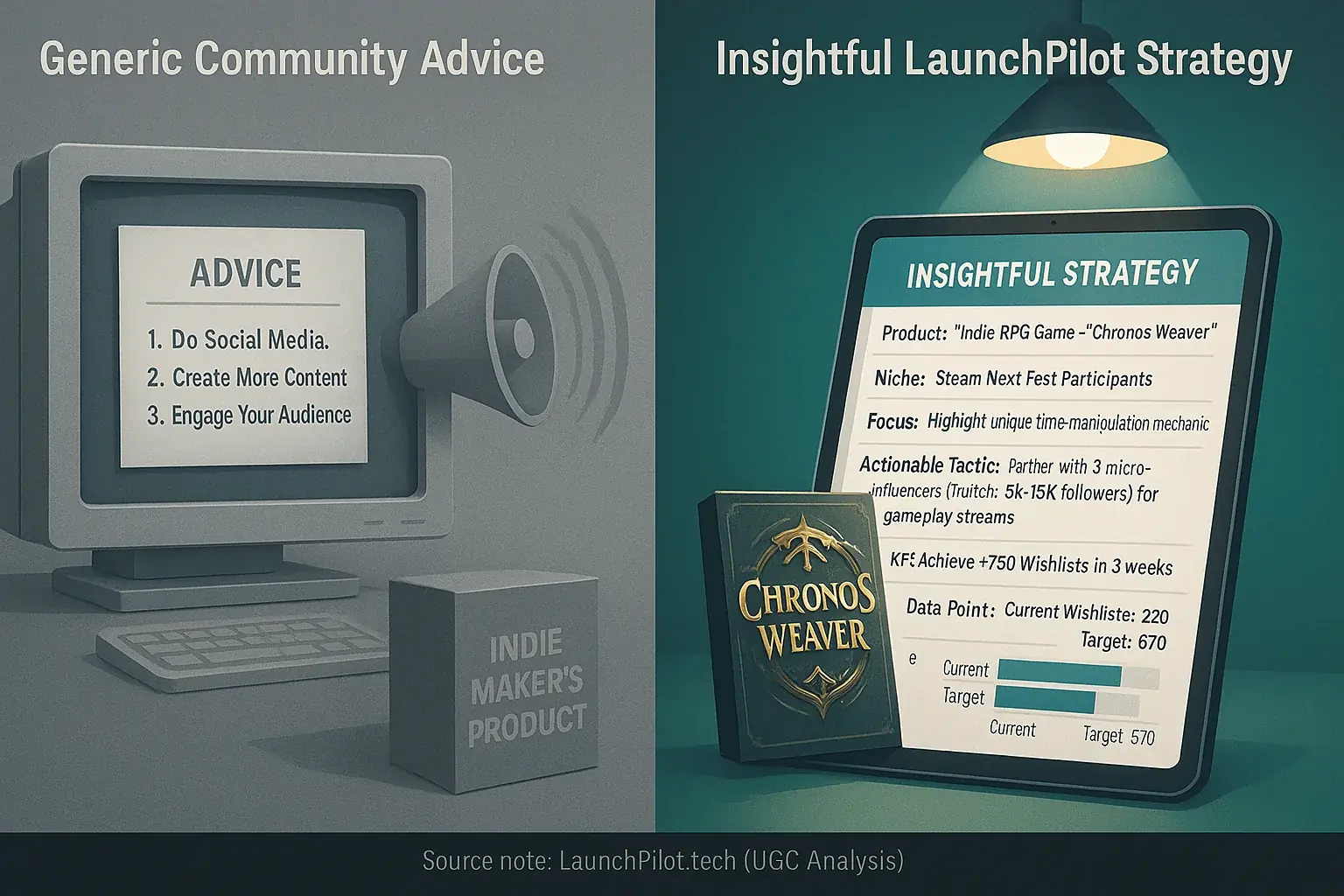
The promise of an data system co-pilot that can 'strategize your launch' sounds like a dream for time-strapped indie makers. Imagine instant market insights, competitor analysis, and a winning go-to-market plan. But here's the critical question: is that data experiences advice truly gold, or just generic noise you could find anywhere?
Our deep dive into user discussions reveals a common frustration. Many consensus shows strategic recommendations are too broad, obvious, or rehash public information. These outputs lack nuanced understanding of specific niches or unique indie product challenges. Users then spend more time refining generic owner analysis outputs than if they had brainstormed from scratch. One indie game developer shared how an our system system suggested 'social media marketing' without specific platform, content type, or audience targeting – an unhelpful 'insight'.
So, what does good strategic guidance look like? Valuable our experiences strategic advice is niche-specific and actionable. It helps you uncover opportunities you might have missed. This guidance leverages data in a way that feels tailored to your product, your audience, and your budget. User experiences point to tools allowing deep input customization; their outputs spark genuine, unique ideas.
Remember this key insight from seasoned makers. An the system is a co-pilot. Not your strategy CEO. Your human intuition, product understanding, and audience connection remain paramount. Use feedback content tools to augment your strategic thinking, not replace it entirely.
Integration Maze: Will Your AI Co-pilot Play Nice with Your Existing Indie Tools?
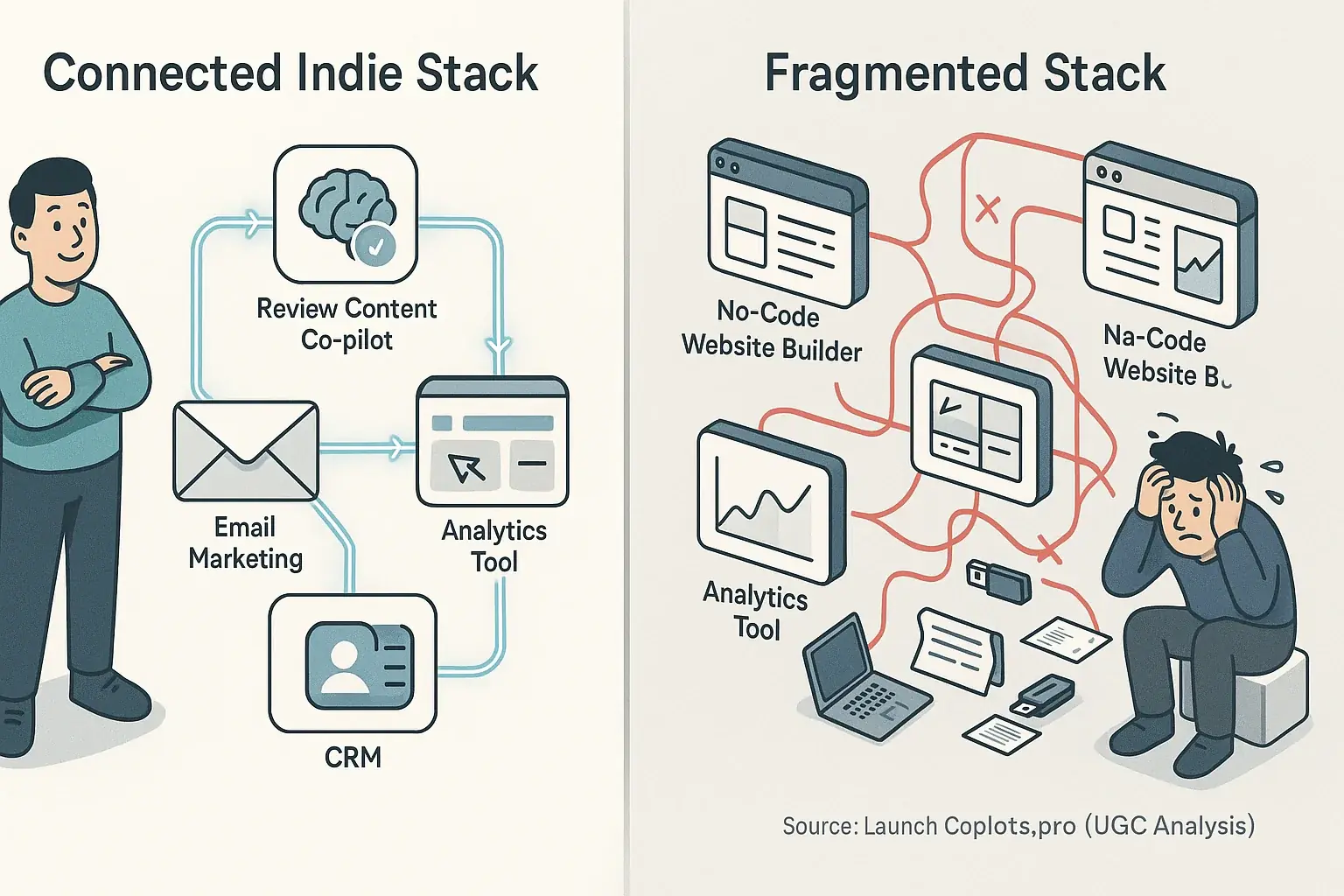
Imagine your owner shows co-pilot not just generating content. Imagine it instantly pushing that content to your email provider. Or scheduling it on social media. Or even updating your website. That is the dream. A truly integrated launch stack. But the reality? It is often a tangled maze. A constant question: will it connect with your existing indie tools?
Many our content tools boast 'integrations'. The indie community reports a different story. These connections are often superficial. Some are buggy. Others only work with large enterprise platforms. This leaves the average indie maker struggling. For those relying on Mailchimp, Notion, or Webflow, a 'seamless' integration can quickly become a manual data transfer nightmare. We saw one indie creator share their frustration. They spent more time exporting insights gathered from user discussions copy. Then importing it into their email system. More time than writing it manually. That is a workflow killer. Plain truth.
Native integrations offer the smoothest path. Prioritize tools with robust native connections for your most critical workflows. What if native is not an option? Check for reliable Zapier or Make.com compatibility. User experiences show these can bridge gaps. But be aware. These workarounds add another layer. Complexity increases. Potential costs too. Indie makers frequently share ingenious workarounds online. These solutions are often born from deep frustration, not from a desire for peak efficiency.
Your our experiences co-pilot should be a force multiplier. It absolutely must not become another data silo. Before you commit to any tool, test its integration capabilities thoroughly. Does it play nice with your existing indie stack? This is crucial. A well-integrated review feedback co-pilot saves you countless hours. It prevents so many headaches down the line. That frees you up. To build. To launch. To grow.
Data Security & Privacy: Protecting Your Indie Product Secrets from AI's Hungry Algorithms

You pour your product's soul, your audience's secrets, and your launch strategy into an our system co-pilot. But where does all that sensitive data go? And who owns it? For indie makers, data security and privacy are not mere buzzwords. They are about protecting your intellectual property and building user trust.
Many users are rightly concerned. Is proprietary launch data training owner content models for others? Is it vulnerable to data breaches? The fine print in service terms often hides crucial details. These details concern data retention, anonymization, and third-party sharing. Our synthesis of indie maker feedback shows deep anxiety. Unique market research or customer insights could become 'public knowledge' via the the system. Imagine feeding your our indicates co-pilot a detailed analysis of your niche's 'secret sauce.' The the system might later generate similar insights for a competitor. That is a real fear, echoed in community discussions.
Look for tools with clear, transparent data policies. These policies must explicitly state how your data is stored. They must detail how it is processed. Crucially, they must clarify if your data trains their owner process models. Prioritize platforms offering robust data encryption. Seek compliance certifications too, like GDPR for relevant audiences. The tool must give you full control over your data.
Your product's success hinges on trust. This means trust from your users. Trust in the tools you use is critical too. A data privacy oversight with your user experiences co-pilot can erode that foundation. Investigate thoroughly. Your future depends on it.
Community & Support: When Your AI Co-pilot Needs a Human Touch (UGC Reviews of Vendor Help)
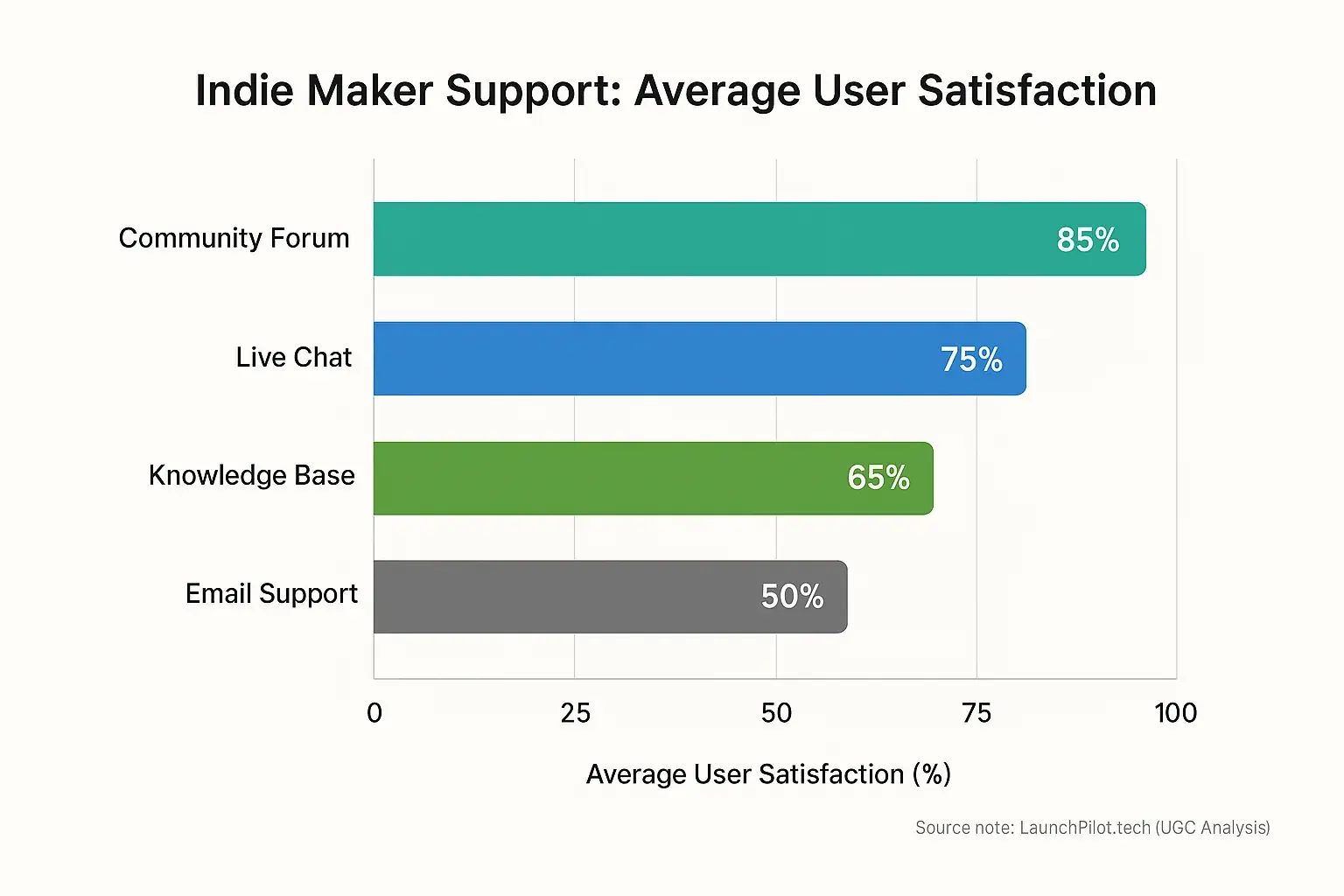
You pilot your launch solo. Every minute counts. A technical glitch can stall progress. Tricky user feedback prompts also create delays. These issues can derail your entire day. Quality customer support is therefore vital. A vibrant user community becomes essential. These are not just 'nice-to-haves'. For indie makers, they are critical lifelines, a fact our comprehensive synthesis of indie maker feedback consistently underscores.
Many data discussions co-pilot tools, especially newer ones, often prioritize feature development. Robust support frequently gets less attention. This is a common theme in user-generated content. Indie makers report frustrating experiences. Slow email responses are a frequent complaint. Unhelpful chatbots cause significant friction. Knowledge bases often miss real-world indie scenarios. We have observed countless discussions. Lack of timely, human support led indie makers to abandon a tool. This happened even with promising core features. One maker recounted waiting 72 hours. A critical integration issue went unresolved. Three days of their launch window. Lost. That directly impacts the bottom line.
So, what defines good support for an indie maker using a data discussions co-pilot? Our investigation into user experiences points to clear signals. Look for tools offering multiple, responsive support channels. Live chat can provide quick answers. Dedicated email support handles complex issues. An active community forum proves invaluable. Users share tips there. Peers offer workarounds. A well-maintained knowledge base with indie-specific tutorials is a huge plus. The presence of a thriving user community often means faster answers. Creative solutions emerge from fellow makers. This collective wisdom is powerful.
Choosing your data discussions co-pilot involves more than the software. It is about the entire ecosystem around it. A strong support system can transform your experience. A helpful community makes a significant difference. These elements distinguish a smooth product journey from a turbulent one. Do not underestimate this. The power of a human touch is real. Especially when your co-pilot needs a little expert help. Patterns observed across extensive user discussions clearly highlight this long-term value.
Your Personalized AI Co-pilot Choice: Trust Your Gut, Guided by Data
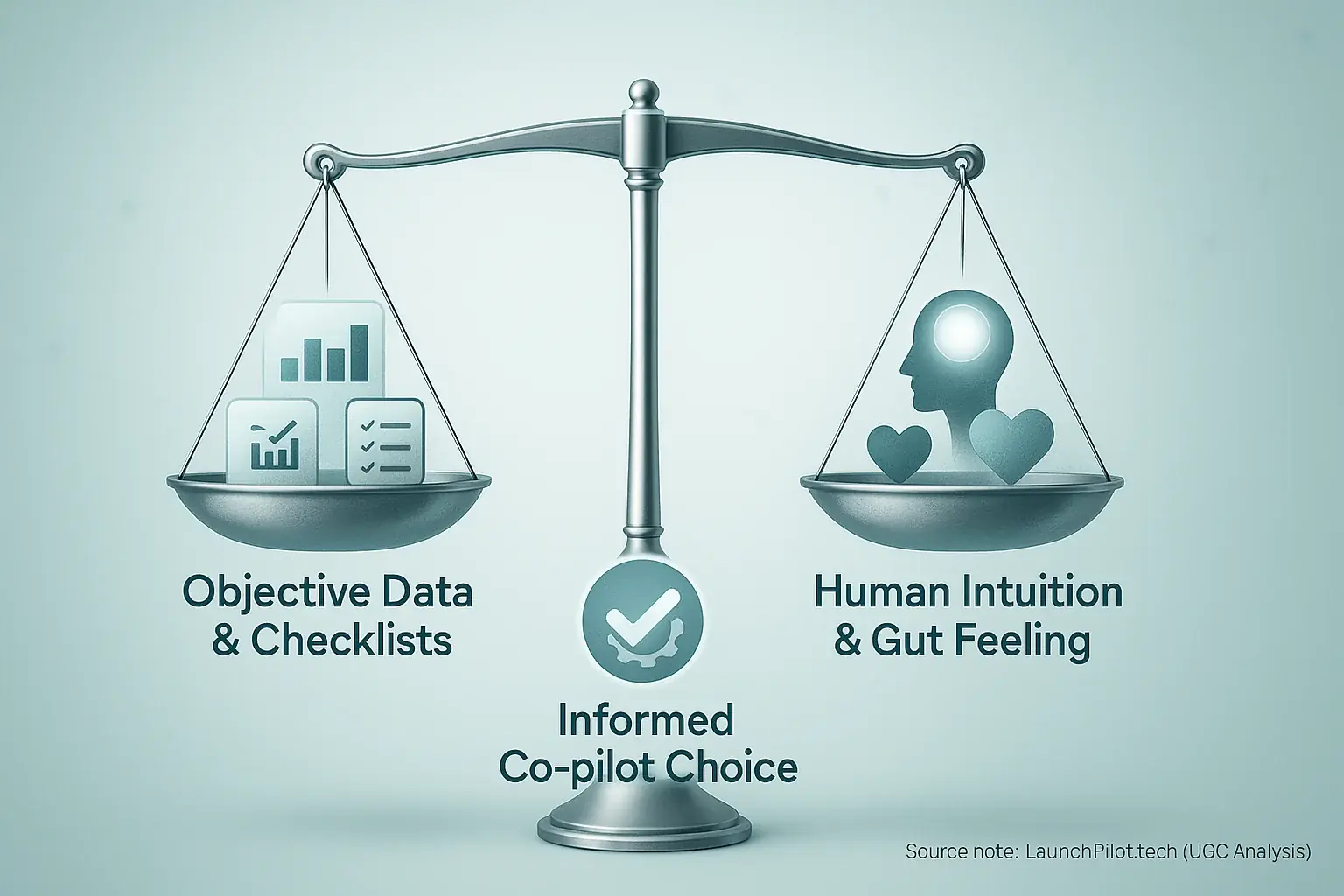
Choosing your feedback analysis co-pilot involves more than feature checklists. Many indie makers confirm this. The right user-generated shows co-pilot truly aligns with your specific workflow. It complements your product's unique character. Your personal comfort with it matters immensely. Our synthesis of user discussions provides the objective data. Your own intuition, however, often points to the best fit.
The 'best' user-generated shows co-pilot isn't one-size-fits-all. It's a deeply personal discovery for each creator. Successful solopreneurs often share stories of finding their tool. This ideal co-pilot accelerates your launch. It enables smarter product decisions. It significantly reduces pre-launch stress. Crucially, it won't force an awkward, unnatural workflow upon you. Trust your direct experience during any trials. That quiet inner voice? Many find it surprisingly accurate.
Our comprehensive analysis of indie maker feedback offers clear patterns. Your keen judgment uses these patterns. You are now equipped to make a truly informed decision. Go choose your co-pilot. Choose with confidence. Prepare for a smoother launch. Anticipate greater success.
Related Insight: Attribute Deep Dive: AI Co-pilot Customer Support for Indie Makers (Responsive Help or Enterprise Maze? - UGC Reviews)
Indie makers juggle countless tasks. Time is incredibly scarce. Getting stuck on a platform issue? That derails projects. Community-reported experiences reveal a critical factor: vendor responsiveness. That's why the quality of customer support and the vibrancy of a user community are not just 'nice-to-haves'. They are critical lifelines for indie makers. Our analysis of user-generated content digs into whether you'll find responsive help or an enterprise maze.
